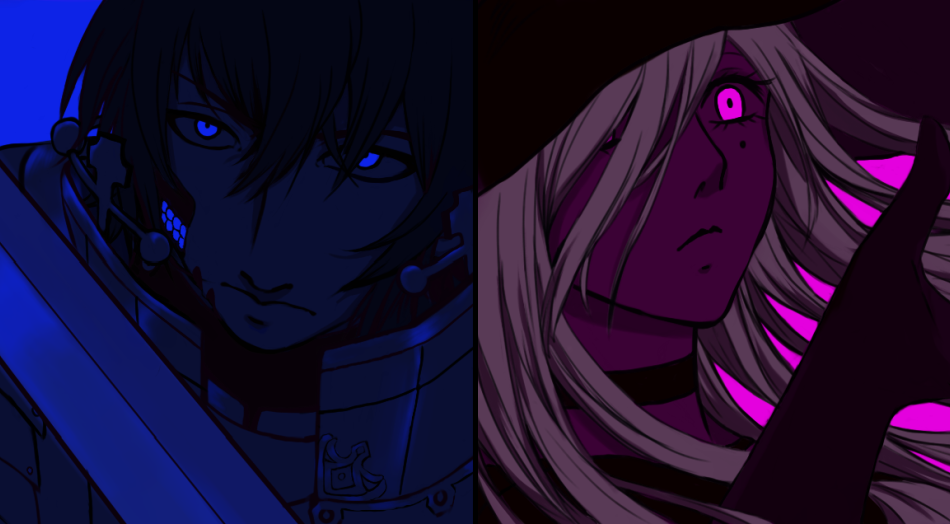Martial vs. Manantial, Disparity and Similarities
With how unpredictable the lives of the Mirrors with which Calvard co-exists alongside have been observed to be, the Academy has published extensive research in trying to categorize and grade civilization on axes of thought which are accurately exclusive to one another. This tends to show up most prominently when trying to assess the differences between those civilizations who are the most magically advanced for our understanding, and those who exhibit the most technological discoveries. Likewise, it is observed that a metric of idealism and pragmatism is taken into account when defining a given city's overarching thought. But nowhere are these polarized extremes observed more than in the Academy's student body.
A student from an industrialist dystopia might arrive wielding the blackpowder firearm made from an apprenticeship in his youth, and yet have no knowledge of the forces of magic ever existing in their world. A student from an arcane geniocracy may have never had need for such materialistic tools, relying solely on golemancy and magecraft to carry themselves on. It is a very interesting dynamic for the Masters of the Academy to work with, and became one of the driving motivations for them to pursue a curricular focus that aims to appeal to all aspects of this spectrum1.
To understand this, a clear distinction is made when conveying to the student body clear doctrinal differences that the mortal body cannot hope to embody simultaneously: Martial, and Manatial.
The Martial school of thought is the most prominent and original teaching that was provided to the earliest students of the Academy. It embodies a clear focus on making the most of the world's natural laws, coming in all forms of forces and physics, which are unable to be changed; only manipulated. These extend to your archetypal 'Fighters,' whether they be swordsmen or archers; your archetypal 'Artificers,' whether they be engineers or alchemists, and even those who blur the line between the natural and unnatural through the use of psionics, abnormal biology, and arguably all of nature itself. These are not considered within the domain of the 'supernatural' or 'arcane,' however examples of Druids who approach nature from a divine or magical perspective do.
The Manantial school of thought, then, covers everything of the obscure supernatural spectrum of "Magic" the Academy is well aware is woven throughout Miralh. It represents the instinctive drive in all living things to evolve themselves and their sapience to new levels, and Mages are no exception. Whether it comes in the form of a studious Wizard fabricating incantations and ritualistic rites that bend arcane forces around them in particular ways, or in the guise of those Sorcerers innately empowered with traces of Magic in their blood, be it from an ancestor or long foregone pact with an outsider force. However, there are other types of people who are considered to fall into this category: the Divine casters. Due to a complete lack of plausible proof that there truly are outsiders so powerful as to be deemed as 'deities,' the workings of those such as Clerics and Paladins of their name are often not considered to be just variations of Sorcerers. Rather, they are understood to be manifesting a raw power from theological prayers being so akin to incantations that magic takes the form of their intended beliefs and wishes. In other words, the fact mortal clergy can perform "Miracles" of arcane power causes them to be considered casters just like any other.
Nominally, Martial wielders will tend to base their strength and power on a metric of stamina and strength or dexterity, depending on their preferences within the school of thought. Mana users, then, are more focused on the varying aspects of intellectual prowess; Wizards will be intelligent, Sorcerers will be wise, and Clerics will be charismatic in each of their respective ways. Even those who slip into a middle-ground of the two schools will never be in true equilibrium, always pushed ever so slightly closer to one over the other.
It is, however, recognized that a limited class of students who are outsiders in of themselves may be considered in a more "Third Way" school of thought, which does not particularly count as either a Martial or Mana-focused discipline. Because of the way supernatural outsiders tend to possess biologically arcane prowess that draws upon their life or stamina as opposed to the energy of magic about them, they are the rare exception. However, as these students are few and far between, no field of study exists for their classification and thus even they must inevitably prioritize which aspect of their natural being to improve through their education.
In the great words of the Headmaster herself, "No one can rely on their quirks alone. Rational ability without education will oft raise you to greater heights than Natural ability with education."
Document Structure
References
[1] For the purposes of visualizing the dispersion of societal values and civilization proficiencies, the below abstract has been composed:
(Axis)
More Pragmatic Society
⬆
More Technologically Inclined ⬅ Balanced ➞ More Magically Inclined (Axis)
⬇
More Idealistic Society
Type
Text, Legislative
Remove these ads. Join the Worldbuilders Guild








